After one of the closest U.S. elections in years—and the first time since 1888 that a president who won the popular vote did not win the presidency—most voters agree that it’s time for a change. Facing antiquated ballot systems, miscalls by TV networks, constitutional confusion, hand counts and recounts, Americans found out that they were using “a rickety electoral system incapable of producing a clear result,” said the New York Times. Now that the nation has had a chance to catch its breath, changes are being considered in Washington, D.C. and state capitals. Columns asked five UW experts to offer five steps each to reform our election system. Here is their advice, including a guess on how many of their ideas might actually come true.
Dan Evans
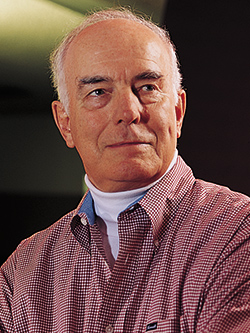 Dan Evans, ’48, ’49, our state’s pre-eminent Republican, was elected to the Legislature in 1956 and became governor, at age 39, in 1964. After three terms, he became president of Evergreen State College (1977-83) and later a U.S. senator (1983-89). He is now a UW regent, adviser to the UW Evans School of Public Affairs and on the boards of many corporations and non-profit groups. He is also working with Sasquatch Books to write a memoir of his political career.
Dan Evans, ’48, ’49, our state’s pre-eminent Republican, was elected to the Legislature in 1956 and became governor, at age 39, in 1964. After three terms, he became president of Evergreen State College (1977-83) and later a U.S. senator (1983-89). He is now a UW regent, adviser to the UW Evans School of Public Affairs and on the boards of many corporations and non-profit groups. He is also working with Sasquatch Books to write a memoir of his political career.
1. Select electors by congressional district.
“I wouldn’t want to abolish the Electoral College, just modify it. It serves a pretty good purpose in a continental country like ours. But I wouldn’t keep the winner-takes-all system. I think we should turn to assigning each electoral vote by the presidential victor in each congressional district. Two at-large votes would go to the candidate winning the state. This system would have made the situation in Florida much less likely. Sure, you’d have some district recounts, but they would not have consequences as big. Maine and Nebraska assign their electors this way now, so I believe a uniform system could be done without modifying the Constitution. I think it could be done by a vote of Congress, although maybe you have to do it on a state-by-state basis, but I think you could pass a federal law.”
2. Legislate uniform closure times and an election holiday.
“The voting polls should close in the continental United States at the same time. That way we wouldn’t have the networks making their projections for Florida and having to take it back twice. Also, I would ban the reporting of exit polls while the voting booths are open, although that would probably run into First Amendment conflicts. We have to give the people a clear, free shot at holding an election without the influence of exit polls and called states. In addition, I’d either move the election day to a Saturday or make election Tuesday a public holiday to give people a chance to vote all day.”
3. Set restrictions on political contributions.
“This one might require a constitutional amendment, which I am hesitant to suggest, but the soft money contributions and increasing use of personal wealth is getting way out of hand. Maria Cantwell is one example and, in New Jersey, Jon Corzine spent more than $60 million of his personal wealth to get elected to the Senate. What if one of our numerous billionaires decides to run for office? This has gotten so far out of hand that we’ve got to get this under control. We should institute restrictions on the use of personal wealth and on unbridled money from organizations. The McCain/Feingold proposal isn’t enough, because it can’t get at the most egregious part of this problem, the soft money.”
4. Have instant reporting of contributions on the Internet.
“With our technology, there is no reason we can’t require instant identification of contributions to candidates, parties and other political organizations such as PACs. It should be reported instantly when the candidates receive the money and it should be illegal to receive money after the election. Otherwise politicians could spend money on the promise of contributions that would not be reported until after the election. I think these contributions need to be reported instantaneously, not within 24 hours.”
5. Establish computerized voting.
“We need to move to a system of computerized or Internet voting. More and more people are comfortable with the Internet. Of course, you’ve got to make sure that you come up with a system that is absolutely secure and difficult or impossible to cheat. You could end up with a system more accurate and you would count the votes a whole lot faster. We need a thorough examination of our voting system to minimize counting problems and maximize the speed so that we’d know who won by a reasonable bedtime.”
What the Future Holds:
“Most of this will come true over a long period of time. The move to reform the Electoral College will come in fits and starts. There will be a number of efforts to eliminate the Electoral College, but the Senate won’t pass it. There won’t be a three-quarters vote of the states to eliminate the Electoral College. But I think there could be a pretty healthy move to modify the Electoral College to reflect the popular vote more accurately.
“I think there is a fair chance we can change the closure time and make Tuesday a holiday. Computers will happen, it’s just a matter of time. And I think it will increase voter participation. Finance reform will be a struggle. It will come piece by piece. No hugely comprehensive campaign finance reform will pass soon. In this Congress you might see a first good step.”
Lis Wiehl
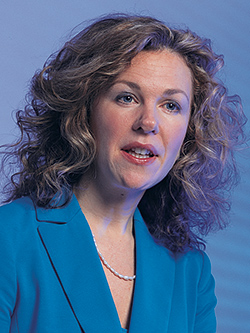 Lis Wiehl is an associate professor in the UW School of Law and director of its Trial Advocacy Program. A former federal prosecutor, her expertise is in ethics, evidence and criminal law. Wiehl was deputy chief counsel for the Democrats on the House Judiciary Committee during the impeachment hearings against President Bill Clinton. She does legal commentary for “All Things Considered” on National Public Radio and is a legal analyst for NBC. “I’m talking about an ideal world here. I’m not sure any of this could really happen,” she says.
Lis Wiehl is an associate professor in the UW School of Law and director of its Trial Advocacy Program. A former federal prosecutor, her expertise is in ethics, evidence and criminal law. Wiehl was deputy chief counsel for the Democrats on the House Judiciary Committee during the impeachment hearings against President Bill Clinton. She does legal commentary for “All Things Considered” on National Public Radio and is a legal analyst for NBC. “I’m talking about an ideal world here. I’m not sure any of this could really happen,” she says.
1. Stop network election projections until polls have closed nationwide.
“We in the West suffer from this every election, but this time, the whole nation suffered. The networks were calling Florida for Gore before some of the polls had closed in the panhandle part of the state. We all know how they had to retract that later, then they called the state for Bush and had to retract that too. After this last example, I think the networks are chastened by this.
“It can’t be legislated. It’s got to be a voluntary thing. They would have to volunteer not to call any state until after 11 p.m. Eastern time. And they would all have to agree to it.”
2. Institute a uniform method of voting.
“Right now the poorer voting districts get the antiquated voting machines and the affluent districts get the good equipment. It’s just wrong.
“I really get irritated by those who have complained about ‘stupid voters who can’t follow directions.’ Listen, people are busy. At the time they are voting they are also trying to get to their jobs and take care of their families. In many places in Florida, there were huge lines and it overwhelmed poll workers. The voters did the best they could with a confusing ballot.
“We need a uniform method of voting. I’m not sure what type, although I sure would ban the butterfly ballot. Maybe fill in the circles like we have in Washington is the best way. I think a committee of election experts would have to decide.”
3. Establish a uniform standard for determining voter intent.
“I’m not sure exactly what that standard would be. But now we have different states with different standards. A pregnant chad might be counted in Texas but not in Illinois. This solution would address some of the equal protection questions raised in the court cases. It would have to be uniform across the nation, which means each legislature would have to set the same standards.”
4. Allow more time for election certification and the legal contest process.
“In the last election Al Gore basically ran out of time. There wasn’t time to have a meaningful recount and then a meaningful contest to the results. Really, the presidential election doesn’t have to be decided by Dec. 18. We could have the Electoral College meet in early January. Let’s have the time periods be uniform and allow more time for each phase so that we can avoid the situation we just had in Florida.”
5. Require automatic recusal for those officials who certify results.
“No matter what you think of (Florida Secretary of State) Katherine Harris, whoever does the election certification should be non-partisan for appearance’s sake. Here we had the co-chair of the Bush campaign in Florida certifying the election of the person she campaigned for. It just looks unfair. We need to inject fairness into the system. Either there should be automatic recusal or the person certifying the election—usually the secretary of state—should be a non-partisan position.”
What the future holds:
“It’s hard to say. I think the networks are going to try to make amends; they will try to do better. But I don’t think they will voluntarily hold off until it’s 11 p.m. in New York. As for a uniform method of voting, I think there may be enough outrage that it will happen. Establishing a uniform standard for voter intent will be hard to do because each state has to pass it, and the same thing with allowing more time for certification and contest of elections. As for automatic recusal, it’s easy, so why not do it?”
William P. Gerberding
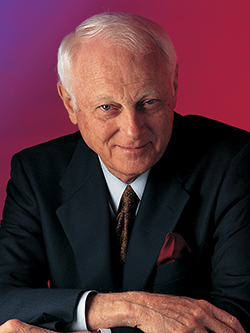 President Emeritus William P. Gerberding served as the head of the UW from 1979 to 1995. What students of that era may not recall is that he started his academic career in political science, earning a Ph.D. at the University of Chicago in 1959. Gerberding then was a congressional fellow and worked on the staffs of Sen. Eugene McCarthy (D-Minn.) and Rep. Frank Thompson, Jr (D-N.J.). He was on the political science faculty at UCLA for 11 years, the last two as chair of the department. Since his retirement, Gerberding has been active on many corporate and non-profit boards, including the board that oversaw the construction of Safeco Field. He also serves as the chair of a roundtable on clinical research scientists for the National Academy of Sciences/Institute of Medicine, which involves representatives of drug companies, other business leaders, faculty, university administrators and government officials. “So I’m back to herding cats again,” he says.
President Emeritus William P. Gerberding served as the head of the UW from 1979 to 1995. What students of that era may not recall is that he started his academic career in political science, earning a Ph.D. at the University of Chicago in 1959. Gerberding then was a congressional fellow and worked on the staffs of Sen. Eugene McCarthy (D-Minn.) and Rep. Frank Thompson, Jr (D-N.J.). He was on the political science faculty at UCLA for 11 years, the last two as chair of the department. Since his retirement, Gerberding has been active on many corporate and non-profit boards, including the board that oversaw the construction of Safeco Field. He also serves as the chair of a roundtable on clinical research scientists for the National Academy of Sciences/Institute of Medicine, which involves representatives of drug companies, other business leaders, faculty, university administrators and government officials. “So I’m back to herding cats again,” he says.
1. Reform the state’s absentee ballot system.
“This idea is close to home. In the state of Washington, I believe we have an absentee ballot system that is an embarrassment. Now we permit voters to send in absentee ballots on the day of the election. We need to change the system to require them to arrive by the day of the election. As they arrive, they should be counted so that as the polls close, we would have 90 percent of the total counted.
“This is a problem that reached its height in the Gorton-Cantwell election for U.S. Senate. Not only is it unfair to the candidates, but it played a minor role in the pageant we just went through with the presidential election, since no one knew if the Senate would be split 50-50 or not. It was an embarrassment.”
2. Modernize how voters vote.
“I know this is the cliché of the week, but what was unearthed in Florida was simply ridiculous. There are many ways to avoid having chads and dimpled ballots. It’s time to throw out the old fashioned systems and have a new one. As far as Internet voting, unless I can be assured it can’t be tampered with by hackers, I’d be leery of that. There may be a technological alternative to the Internet. It would also be a good idea to have a uniform ballot system across the United States, but it might be hard to accomplish since there would be so many objections on states-rights grounds.”
3. Establish a closed primary for Washington state.
“A recent U.S. Supreme Court decision banned blanket primary systems where voters can cross over the ballot in primaries and vote for whomever they want. I agree with that. I am hoping that the state of Washington will establish a ‘closed primary,’ where the voter registers as a Republican or a Democrat or a Green or a Libertarian for the primary. Of course, you don’t have to register in the general election.
“There is something called an ‘open primary’ where you don’t register, but each time you vote in a primary, you ask for a specific ballot, such as the Democratic ballot or the Republican ballot. But the closed primary is the best. People with strong partisan opinions ought to be able to select the candidates for their parties. I’m a strong advocate of political parties. This would strengthen them.”
4. Applaud partisanship.
“A lot of pundits and people are saying that the 50-50 election is a mandate for bipartisanship. It is no such thing. It is a reflection of a sharply and evenly divided electorate, not a call for bipartisanship. This election is a reflection of acute partisanship, and that’s a good thing. And I don’t mean the bitterness and the hostilities and the unwillingness to compromise when I talk about partisanship. Partisanship is a good thing. Voters ought to go into a voting booth and express themselves on a whole range of issues. A partisan divide is not bad, it’s good. It reflects the honest opinions of a free people.”
5. Reform the initiative process.
“The initiative process has become an abomination. It is a classic illustration of the unanticipated consequences of reform. The Progressives brought it in 100 years ago as a response to state legislatures and Congress in the hip pockets of moneyed interests.
“Today it is taken to its extremes in places like California, Oregon and Washington and it is seriously undermining representative government. The Tim Eymans of the world are responsible to no one. They don’t have to live with the consequences of their actions. How to balance the budget or fix the potholes, that is not their problem. They are not accountable.
The legislators and the governor are accountable. If we don’t like what they are doing, we throw them out of office. I am a strong advocate of representative democracy, not direct democracy. So I would make it much harder to get initiatives on the ballot. It should take twice the number of signatures it does today.”
What the future holds:
“I’m afraid nothing will happen with initiatives. And I think Washington state will get the open primary, not the closed primary that I feel is better. I do feel that Florida and a lot of places will clean up their act after this debacle. As for changing absentee ballots in our state, it won’t happen. Legislators have told me that tampering with absentee ballots is like the third rail on a subway system—no one will touch it.
“I don’t think political parties will get weaker. They are an essential factor in our political system.”
Mark Smith
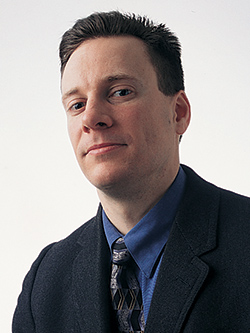 Mark Smith is an assistant professor of political science who has been teaching at the UW for four years. His courses include Introduction to American Politics, American Interest Groups, the U.S. Congress, and Public Opinion. A graduate of MIT and the University of Minnesota, Smith published his first book, American Business and Political Power, in September.
Mark Smith is an assistant professor of political science who has been teaching at the UW for four years. His courses include Introduction to American Politics, American Interest Groups, the U.S. Congress, and Public Opinion. A graduate of MIT and the University of Minnesota, Smith published his first book, American Business and Political Power, in September.
1. Use electronic balloting systems.
“Given the number of undervotes and overvotes in Florida, we may never know who really won the election. There are some counties in Colorado and Texas which use an electronic ballot system that is like an ATM. You make your choice just as you would withdraw money from an ATM. The machine prevents voting for more than one candidate and, before you are through, it confirms your choices. It minimizes the possibility of making a mistake.
“In Florida we had 2 to 3 percent of the population registering no preference for president. In those counties in Texas and Colorado that used the electronic ballot system, the non-voting rate for president was 0.1 percent or 0.2 percent, really low. There is no question that the non-voting rate is much higher under a punch card system.
“I wouldn’t recommend voting over the Internet, however. It is too vulnerable to hacking. These electronic ballot machines are not networked. Each one serves as a stand-alone unit, so they are more secure.”
2. Launch public financing of campaigns.
“We need to have public financing for campaigns as is being done or planned in four states. Those states are Vermont, Maine, Massachusetts and Arizona. All of them were passed by voter initiatives except for Vermont. They are just beginning and we ought to watch this. It would relieve the candidate of the pressures of raising money from private sources and free the candidate up to devote more time to the issues. It would eliminate real or perceived conflicts of interest—buying the votes—and that could help restore legitimacy for our political system.”
3. Lengthen the time between primaries and the general election.
“I’m talking about the general election of legislators, state officials, representatives and senators in Congress. In our state we hold the primary in September, that’s only two months away from the general election. If you run in a contested primary, you may not have any money left over for the general election. The system we currently have tends to favor incumbents. We’d be better off having our state primary in June.”
4. Create regional primaries for presidential elections.
“We have to rationalize our primary system. New Hampshire goes first only because of tradition. We need to have a rotating, regional primary system. Over the span of four elections, each region would have a chance to go first. You could have the South go first in 2004 and then the Midwest go first in 2008.”
5. Emphasize the issues instead of the horse race.
“It’s sad. On your local news station, more time is devoted to the candidates during the commercial breaks than is spent during the news segment. When you do get coverage locally or nationally, reporters cover the horse race aspects—who’s ahead and who’s behind—rather than the issues.
“We need to put pressure on journalists to cover substantive issues, but how? The Federal Communications Act says broadcasters have to do programs in the public interest. We need more pressure brought to bear by the general public to pay more attention to the issues.”
What the future holds:
“Whenever you make a prediction about the future, the best guess is to select the way we do things now. Any change is difficult in our political system of checks and balances. There are lots of blocking points, especially when it comes to rules about changing elections. After all, that’s a politician’s bread and butter. If I had to make a prediction, I’d say there will be very little change in our electoral system.”
David Olson
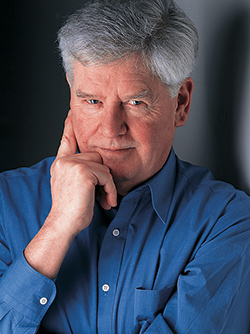 Political Science Professor David Olson is a former chair of the department and was the first UW professor to hold the Harry Bridges Chair in Labor Studies. The author of five books about politics, including Theft of the City, Olson is often quoted by local and national media and recently gave expert witness testimony in the U.S. 9th Court of Appeals case on blanket primaries.
Political Science Professor David Olson is a former chair of the department and was the first UW professor to hold the Harry Bridges Chair in Labor Studies. The author of five books about politics, including Theft of the City, Olson is often quoted by local and national media and recently gave expert witness testimony in the U.S. 9th Court of Appeals case on blanket primaries.
1. Establish the direct popular vote of the president.
“This is the most popular method and regularly receives the support of 80 percent of the American public in polls. Whoever has the majority or plurality of the popular vote is the winner. If the plurality is less than 40 percent, we would have a run-off between the top two candidates. If the plurality is 40 percent or above, the winner is the president. There are several states that elect their governors under this plurality system.
“The smaller states would be clobbered in terms of national policy under this system. Presidential politics would ignore places like North Dakota or Idaho and pay attention to California, Texas and New York. It magnifies the role of the populous states that tend to vote for one party. Of course, this requires a constitutional amendment.”
2. Impose a proportional system of selecting electors.
“If the direct vote idea stalls, this alternative would preserve the Electoral College but get rid of its winner-takes-all system. Under a proportional system, you determine the split by popular vote within each state. If Gore got 56 percent of the Washington state vote, he would get 56 percent of the electors. This idea is less radical than direct vote so it is a little easier to effect, but to get all the states to do it, you’d need a constitutional amendment.”
3. Select electors by congressional district.
“This one moves the winner-takes-all system down one level. Instead of considering the entire state, each congressional district would determine one elector. Whoever carried the state would get two at-large electors as well. In our state we have 11 electors in the Electoral College. In the last election, I think that Gore won six of our congressional districts and Bush won three. Gore also took the state, so the final total would be 8 for Gore and 3 for Bush.
“Conservatives like this proposal a lot. It gives maximum power to the smaller states. One other side effect, it encourages third party candidates enormously.”
4. Create automatic electoral votes.
“Instead of having an actual, living elector who makes his or her vote on Dec. 18, just automatically award the electoral vote to the winning candidate. This is the most modest of reform proposals and would get rid of the threat of a wayward elector. Even though it is very benign, it would still require the passage of a constitutional amendment.”
5. Institute election process reforms.
“The flaw in Florida is not in the Electoral College, it’s in election process abuse. We’ve got to see election law reform and strengthen the federal election system. Some of those steps include banning butterfly ballots, prohibiting unmonitored voting precincts, outlawing inaccurate voting technologies and eliminating inequities in the counting of overseas ballots. The Federal Elections Commission should be strengthened and broadened in its scope.”
What the Future Holds:
“As far as the Electoral College goes, nothing will be done. There are too many vested interests in the current system. Any time you change a system like this, there are winners and losers. The Electoral College was a device to guarantee that small states would not be beat up by big states. The Federalist Papers are explicit on this. With reform or abolishing the Electoral College, it significantly reduces the power of small states. In 2004 we will be using exactly the same system we’ve used over the years.
“On other issues, significant attention will be paid to election law reform. What we’ve seen in Florida is shocking. Florida is revealing the warts of the election system. Although it really doesn’t have anything to do with the mess in Florida, probably the biggest boost will go to campaign finance reform.”